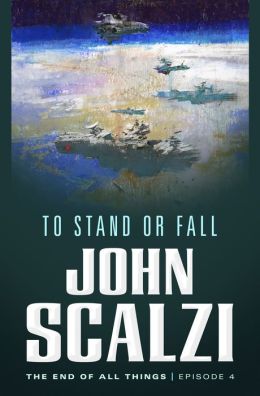The End of All Things is John Scalzi’s sixth foray into the Old Man’s War universe, and a direct sequel to The Human Division (2013). Like its predecessor, it is being serialized prior to the paperback release, albeit in four rather than thirteen parts. This review series follows the serialization schedule, with an entry for each episode. However, whereas previous entries (one, two, three) in this review series have focused on the “To Stand or Fall,” this entry will also draw broader conclusions about the novel as a whole.
Warning: some spoilers were an inevitable consequence of writing this review. Those who are spoiler-sensitive should tread carefully.
In the fourth and final installment, Scalzi engages the long-awaited perspective shift back to Harry Wilson, Ambassador Abumwe and the ex-crew of the Clarke (now ensconced on the Chandler, piloted by the star of episode one, Rafe Daquin). As you’ll recall, the CDF has just foiled the Equilibrium plot to use independence votes as a mechanism through which to goad the Colonial Union into an ultimately self-defeating crackdown on its member planets. But as soon becomes clear, that is not Equilibrium’s only set of victory conditions. Rather, Wilson uncovers a darker, more sinister plan in the works—one that can only be countered by a total re-evaluation of how the Colonial Union operates.
“To Stand or Fall” is essentially divided into three parts, the first of which centers on Wilson’s interrogation of his Rraey and human prisoners. It is smartly written, with strategic use of Scalzi’s trademark dry wit. Wilson plays his cards deftly, and is entirely believable in the interrogator’s role of “good cop,” while the section serves to reveal Equilibrium’s plot—one that threatens to make use of both its slave ships and the Colonial Union’s penchant for overreaction to (real and perceived) enemies.
The second part of the novella shifts to Abumwe, the gruff but straight-shooting diplomat who has quickly emerged as the one person capable of saving the Colonial Union from itself, as she attempts to head off the impending disaster, as well as the Colonial Union/Conclave war that threatens to emerge in its wake. Again, it’s well done: nicely written, smart and well paced.
Then comes the climactic sequence, which takes up the least real estate in the episode. And here’s the thing: the story shouldn’t end here. But it does, and in order for it to do so, the climactic action sequence—the one we’ve all been waiting for—happens too fast, and comes too easy. In fact there’s no action, just a speech and some voiceover-style narration telling us what happened next. To be honest, I was taken aback, because Scalzi is very good at plotting action sequences (see, for example, the end of The Human Division). So why not here?
I can’t pretend to have the answer; after all, I didn’t write the novel. But I do wonder if the rushed ending is a function of the serialization format adopted in this volume, or if it stems from a conscious choice to forego the requisite battle climax in order to end on a more affirmative note. (Or maybe Scalzi simply just ran out of time and space.) Regardless, it’s anticlimactic, and missing what could have been a thrilling space battle. And while I’m not averse to resolving things without violence, there should at least be enough tension to keep the outcome in doubt, and unfortunately there isn’t. Meanwhile, the “faith in constitutional democracy” angle feels a bit too much like a civics lesson for my tastes. So yeah–missed opportunity.
Disappointment at the ending notwithstanding, I did greatly enjoy The End of All Things. It wasn’t at all what I was expecting, but nearly all the surprises worked really well. The four-novella structure is also, I think, an improvement on the “TV season” format of The Human Division, and though The End of All Things has fewer “big moments” relative to its predecessor, on balance I think it’s the stronger and more cohesive of the two.
Of the four episodes, I feel most attached to “Can Long Endure,” which is the darkest, the most action-packed and, for my money, the most politically sophisticated of the bunch. I’m quite curious to know how it works when read on its own, and suspect the answer is “very well.” So if you’ve gone that route, let me know in the comments.
Final Verdict: Despite a relatively weak ending, The End of All Things is on balance highly entertaining, a must-read for Scalzi fans and a worthy sequel to The Human Division.
To Stand or Fall is available now as an ebook from Tor Books. The End of All Things publishes August 11th.
Read an excerpt from the novella, or start with Episode 1: The Life of the Mind.
The G is founder and co-editor of the group blog ‘nerds of a feather, flock together’, which covers SF/F and crime fiction, comics, cult films and video games. He moonlights as an academic.










